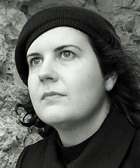Núria Añó
| Núria Añó | |
|---|---|
 Núria Añó in 2009 | |
| Born |
10 February 1973 Lleida, Catalonia, Spain |
| Occupation | Writer, novelist, essayist |
| Language | Catalan, Spanish |
| Nationality | Spanish |
| Genre | social criticism |
| Website | |
|
www | |
Núria Añó (Catalan: [ˈnuɾiə əˈɲo], Spanish: [ˈnuɾja aˈɲo]; born 1973 in Lleida, Catalonia, Spain) studied Catalan Philology and German Language. She is a Catalan writer, a translator and a speaker at conferences and symposia, where she gives papers on literary creation or authors like Elfriede Jelinek, Patricia Highsmith, Salka Viertel, Franz Werfel, Karen Blixen or Alexandre Dumas, fils.
Añó started writing tales at a young age and published her first story in 1990. After that some of her short stories have been published in anthology books. In 1996 she was awarded the 18th City of Almenara Joan Fuster Prize for Fiction. Her fiction story 2066. Comença l'etapa de correcció (2066. Beginning the age of correction)[1] or Presage,[2] about domestic violence, both are translated into English. Also some articles and essays such as The Mother Tongue in Foreign Lands or about the city of Shanghai A Catalyst City for Creativity are translated into Spanish, English, French, German, Italian, Polish, Chinese or Latvian.
Her first novel Els nens de l'Elisa was third among the finalists for the 24th Ramon Llull Prize[3] for Catalan literature, one of the most relevant literary awards in Catalan language. L'escriptora morta was published in 2008 and Núvols baixos, in 2009. La mirada del fill, published in 2012, is her most recent novel. Today, some of her novels are translated into Spanish.
Style
Añó's writing style is very ambitious and risky, it focuses on the psychology of her characters, generally antiheroes avoiding Manichaeism.[4] "The characters are the most important" in her books, "much more than the topic",[5] due to "an introspection, a reflection, not sentimental, but feminine".[6] Although her novels cover a multitude of topics, treat actual and socially relevant problems, injustices and poor communication between people. Frequently, the core of her stories remains unexplained and Núria Añó asks the reader to discover the "deeper meaning"[7] and to become involved in the events presented.
Awards
In 2016 she was distinguished by the culture association Nuoren Voiman Liitto in Sysmä, Finland. Later, she won a grant at the Shanghai Writing Program, in Shanghai, China. In 2017 she was distinguished by the Baltic Centre for Writers and Translators in Visby, Sweden. Late in the fall, by International Writer's and Translators' Center of Rhodes in Greece. In 2018 she was selected for the residency Krakow UNESCO City of Literature in Poland.
Bibliography
Novels
- Els nens de l'Elisa (Elisa's Children); Omicron 2006 ISBN 84-96496-26-0 EAN 9788496496262
- L'escriptora morta (The Dead Writer); Omicron 2008 ISBN 978-84-96496-65-1
- Núvols baixos (Low Clouds); Omicron 2009 ISBN 978-84-92544-28-8
- La mirada del fill (The son's Gaze); Abadia 2012 ISBN 978-84-96847-77-4
- La escritora muerta (The Dead Writer); 2018 ISBN 978-19-81078-95-0 (Spanish language)
Short stories
- Lluvia de primavera, La República Literaria 1991.
- Dones i Literatura a Lleida, Ajuntament de Lleida, 1997 (collective book).
- VIII Concurs de Narrativa Mercè Rodoreda, Ràdio Molins de Rei, 1997 (collective book).
- Estrenes, Universitat de Lleida, 2005 (collective book).
- 2066. Beginning the age of correction, Cafebabel, Paris, 2006.
- Escata de drac, Ajuntament de Lleida, 2012 (collective book).
- Fábula, núm. 35, Univ. of La Rioja, 2013 (collective book).
- Issue 3. Grief, When Women Waken, 2014. (collective book).
- Resonancias, no. 127, París, 2014. (collective book).
- Letralia, Year XXI (2016);
- Revista Narrativas, no. 43, 2016. (collective book).
- April Issue, Nebula, 2017. (collective book).
- Domuzime, no. 4, 2017. (collective book).
- Revista Literaria Visor, no. 12, 2018. (collective book).
Essay
- Des lettres et des femmes... La femme face aux défis de l'histoire, Peter Lang, 2013. (collective book)
- Les romancières sentimentales: nouvelles approches, nouvelles perspectives, L'ull crític 17-18, Universitat de Lleida, 2014. (collective book).
- Cien años del Genocidio Armenio: Un siglo de silencio, Editarx, 2016. (collective book).
- L'art de l'adaptation: féminité et roman populaire, University of Lleida, 2016. (collective book).
- Cine y Literatura, Editorial Letralia, 2017. (collective book).
- The Mother Tongue in a Foreign Land, Shanghai Writers' Association, 2017. (collective book).
- Exilios y desarraigos, Editorial Letralia, 2018. (collective book).
See also
References
- ↑ The short story "2066. Beginning the age of correction". Cafebabel, June 19, 2006. (in English)
- ↑ The short story "Presage". Fall 2013 Issue 3 – Grief, 2013. (in English)
- ↑ "Deu obres passen a la recta final del Premi Ramon Llull". Vilaweb, January 28, 2004.
- ↑ "Not, A.: Critic review of the book Els nens de l'Elisa, in: Ateneu, La Mañana, September 24, 2006, page 63.
- ↑ "Sáez, A.: Interview with the author, in: Segre, September 12, 2006.
- ↑ "Santa, A.: About the book Núvols baixos, in the Public Library of Lleida: Segre", June 20, 2010.
- ↑ "La leridana Núria Añó narra la historia de una actriz en la madurez de su profesión". La Mañana, June 28, 2009.
External links
- Núria Añó official website (in Catalan) (in Spanish) (in English)
- Association of Catalan Language Writers (in English)
- Dones i Cultura (in Catalan)
- Franco não mora mais aqui Revista Bravo (in Portuguese)
- L'écriture au féminin Universitat de Lleida (in Catalan) (in French)
- El Poder de la Palabra (in Spanish)
| Wikimedia Commons has media related to Núria Añó. |
| Wikiquote has quotations related to: Núria Añó |